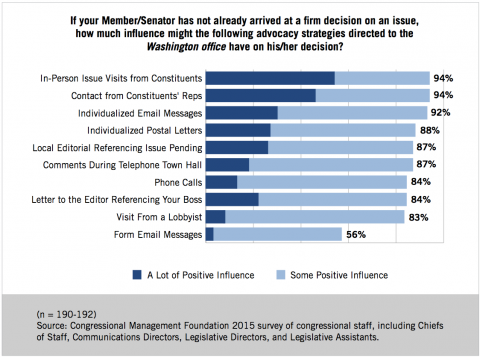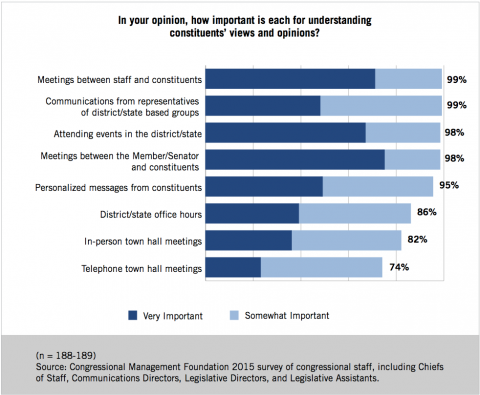Why Should You Advocate for Your Science?
Whether you want to be convinced or you're looking for some information to help convince your peers, this page is meant to provide some explanation about why we think you should advocate for your science.
According to a July 2016 Rasmussen survey, only 11% of people registered to vote in the US think that their members of Congress listen to them. This statistic is at odds with the results of a comprehensive study about citizen engagement with Congress, the Congressional Management Foundation's report Citizen-Centric Advocacy: The Untapped Power of Constituent Engagement.
Your power in advocacy comes from your status as constituents.
The figure to the right (top) summarizes the responses of 190 offices to the question "If your Member/Senator has not already arrived at a firm decision on an issue, how much influence might the following advocacy strategies directed to the Washington office have on his/her decision?"
Between 88% and 94% of offices indicated that your individual messages, in the form of letters, emails, calls, or in-person visits, have a positive influence on a member's decision. If you're hoping to have "a lot of positive influence," then these are still the highest-rated advocacy strategies, with results between 25% and 50%. While the AAS Policy team are not lobbyists, when we advocate on your behalf we come closest to the "Visit From a Lobbyist" category. That means that we have a lot of positive influence in only 10% of offices.
The CMF report also provides some survey data to answer the question "In your opinion, how important is each for understanding constituents' views and opinions?" (figure to the right, bottom). Nearly every office responded that meetings and communications with constituents are important.
All of this is why we run programs like Congressional Visits Day and encourage you to arrange local, in-district visits with your members of Congress and contact your members of Congress.


Does advocating harm your credibility as scientists?
This is an active area of research, and the conclusion so far is no, advocacy does not harm your credibility as a scientist or science in general. In an experiment that surveyed over 1,000 people, researchers asked each person to rate whether they viewed a scientist as credible after reading one of six different statements made by the scientist. This particular experiment was focused on public reactions to statements of climate change scientists. Each of the statements represented a different level of advocacy, including a control statement that was only a presentation of a fact, a statement that included an interpretation of that fact, a statement that included policy options, a statement that included the opinion that some policy action was needed, and a statement that included the opinion that a specific policy action was needed. The group concluded that the scientist's credibility did not suffer even for the statements that included opinion — there was no statistical difference in the level of credibility for the different statements.
The results of this experiment were presented at the 2014 American Geophysical Union (AGU) meeting, and the poster can be viewed online. AGU's Eos also summarized the findings in greater detail in Scientist Credibility Unhurt by Climate Advocacy, Study Suggests.

